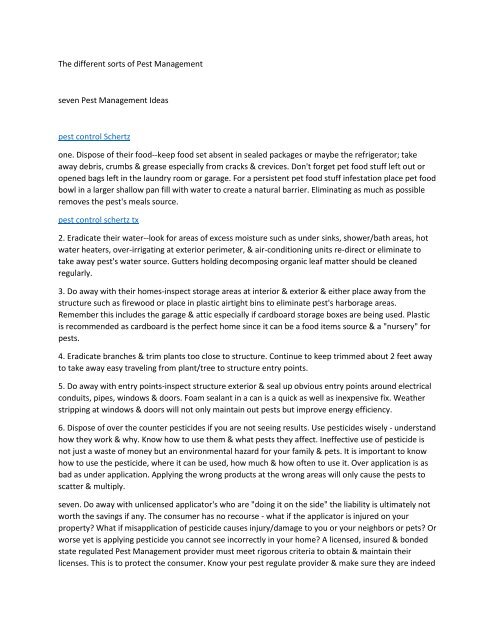Create successful ePaper yourself
Turn your PDF publications into a flip-book with our unique Google optimized e-Paper software.
<strong>The</strong> <strong>different</strong> <strong>sorts</strong> <strong>of</strong> <strong>Pest</strong> Management<br />
seven <strong>Pest</strong> Management Ideas<br />
pest control Schertz<br />
one. Dispose <strong>of</strong> their food--keep food set absent in sealed packages or maybe the refrigerator; take<br />
away debris, crumbs & grease especially from cracks & crevices. Don't forget pet food stuff left out or<br />
opened bags left in the laundry room or garage. For a persistent pet food stuff infestation place pet food<br />
bowl in a larger shallow pan fill with water to create a natural barrier. Eliminating as much as possible<br />
removes the pest's meals source.<br />
pest control schertz tx<br />
2. Eradicate their water--look for areas <strong>of</strong> excess moisture such as under sinks, shower/bath areas, hot<br />
water heaters, over-irrigating at exterior perimeter, & air-conditioning units re-direct or eliminate to<br />
take away pest's water source. Gutters holding decomposing organic leaf matter should be cleaned<br />
regularly.<br />
3. Do away with their homes-inspect storage areas at interior & exterior & either place away from the<br />
structure such as firewood or place in plastic airtight bins to eliminate pest's harborage areas.<br />
Remember this includes the garage & attic especially if cardboard storage boxes are being used. Plastic<br />
is recommended as cardboard is the perfect home since it can be a food items source & a "nursery" for<br />
pests.<br />
4. Eradicate branches & trim plants too close to structure. Continue to keep trimmed about 2 feet away<br />
to take away easy traveling from plant/tree to structure entry points.<br />
5. Do away with entry points-inspect structure exterior & seal up obvious entry points around electrical<br />
conduits, pipes, windows & doors. Foam sealant in a can is a quick as well as inexpensive fix. Weather<br />
stripping at windows & doors will not only maintain out pests but improve energy efficiency.<br />
6. Dispose <strong>of</strong> over the counter pesticides if you are not seeing results. Use pesticides wisely - understand<br />
how they work & why. Know how to use them & what pests they affect. Ineffective use <strong>of</strong> pesticide is<br />
not just a waste <strong>of</strong> money but an environmental hazard for your family & pets. It is important to know<br />
how to use the pesticide, where it can be used, how much & how <strong>of</strong>ten to use it. Over application is as<br />
bad as under application. Applying the wrong products at the wrong areas will only cause the pests to<br />
scatter & multiply.<br />
seven. Do away with unlicensed applicator's who are "doing it on the side" the liability is ultimately not<br />
worth the savings if any. <strong>The</strong> consumer has no recourse - what if the applicator is injured on your<br />
property? What if misapplication <strong>of</strong> pesticide causes injury/damage to you or your neighbors or pets? Or<br />
worse yet is applying pesticide you cannot see incorrectly in your home? A licensed, insured & bonded<br />
state regulated <strong>Pest</strong> Management provider must meet rigorous criteria to obtain & maintain their<br />
licenses. This is to protect the consumer. Know your pest regulate provider & make sure they are indeed
state licensed & insured. See if they belong to industry related organizations & consumer protection<br />
organizations such as the Better Business Bureau.<br />
3 Most Common <strong>Pest</strong> Management Mistakes<br />
Purchasing over the counter sprays & self- treating. Many grocery store products simply do not provide<br />
lasting benefits & ultimately cause more trouble than they are worth. If you currently have a pest handle<br />
provider many times the spray you purchase is a contact repellant that kills the pests you see but has no<br />
lasting residual & actually contaminates the pr<strong>of</strong>essional products in place. Using repellant sprays cause<br />
a phenomenon called "budding" with many species <strong>of</strong> ants. <strong>The</strong> workers are killed & do not return to<br />
the colony. <strong>The</strong> colony will then create more queens & they will "bud" creating more colonies! Roaches<br />
infestations may temporarily reduce but the larvae will soon hatch. Sprays for Bed Bug infestations end<br />
up spreading the infestation as they will avoid the sprayed areas for a short time. Our suggestion would<br />
be if you have an occasional invading pest spritz it with window cleaning spray-same result less<br />
expensive & definitely less toxic! On-going pest problems need pr<strong>of</strong>essional treatment.<br />
Starting a pest regulate service while you see pests & stopping when you don't see pest. <strong>The</strong> pest you<br />
don't see are not necessarily gone - they are under regulate. <strong>Pest</strong> will remain in the environment & will<br />
always be looking for meals, water & harborage. <strong>The</strong> pest manage provider's goal is to control them in<br />
your environment. Stopping service because you don't see pest will lead to pest populations getting out<br />
<strong>of</strong> control again. Consistent & regular pest control service will break that cycle.<br />
Not knowing & understanding the <strong>Pest</strong> Handle provider's treatment plan. Make sure you know &<br />
understand what your provider is doing for your service. Ask questions, check licenses, ask what they<br />
are treating your property with & why. Your <strong>Pest</strong> Command provider should be able to provide answers<br />
& suggestions for your pest manage needs. "Green" products are regularly used in the industry today to<br />
reduce environmental impact. Find out what products will work for your home. If your <strong>Pest</strong> command<br />
provider seems to be just looking around your property find out why-better technicians will ALWAYS<br />
inspect before ever applying product. Learn more about IPM practices from your provider. If they don't<br />
provide information & treatment plans incorporating IPM Practices & "Green" products call a company<br />
that can!


















